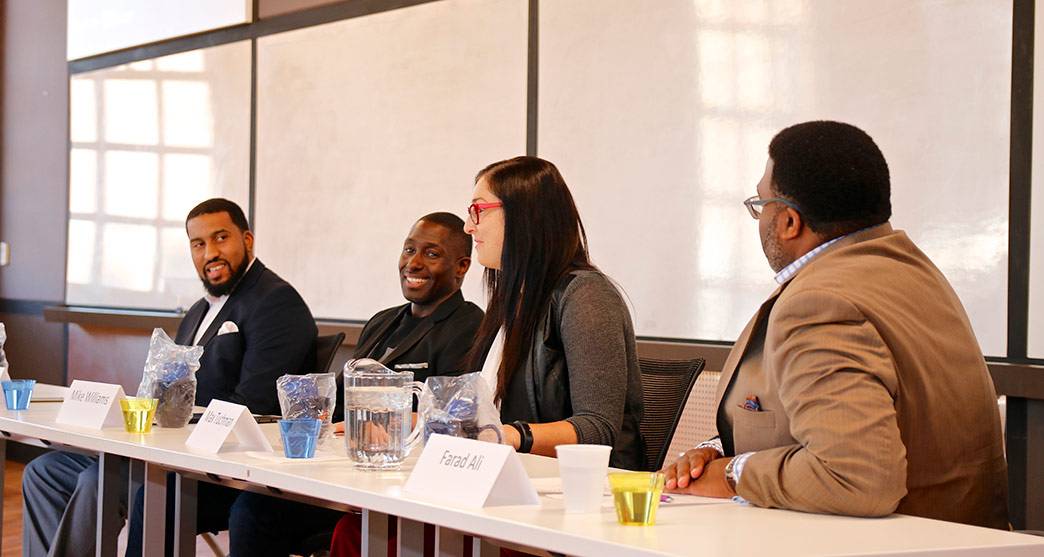At I&E Event, Entrepreneurs Talk Race in Social Innovation

Three social entrepreneurs spoke Thursday on race in social innovation at the Bullpen, the home of the Duke Innovation & Entrepreneurship Initiative.
The conversation, which took place March 23, discussed problems that minority social entrepreneurs face daily, such as unequal funding and implicit biases. The panel, which was attended by about 80 people, was hosted by Duke I&E and by the Duke Center for the Advancement of Social Entrepreneurship (CASE).
Sitting on the panel were Maxeme Tuchman, the Latina founder of Caribu, which allows parents to read to and draw with their children even when they’re away from home; Mike Williams, the African-American founder of the Black on Black Project, which advocates for African-American artists; and Dorian Burton, an African-American who works in philanthropy and is the co-founder of TandemED, an organization that supports communities to take control of their own narratives and empower their youth.
Farad Ali, president and CEO of the Institute of Minority Economic Development, facilitated the panel.
All three social entrepreneurs work to build racial equity and justice, and all three social entrepreneurs focus on children in their work.
Although Caribu is a for-profit business that often sells its product to affluent families, Tuchman said, a section of the business focuses on lower-income families. With just a smart phone, Tuchman said, these parents have access to the program and can help build their children’s literacy.
Burton said he also advocates for children. Often, the stereotype is that black families are broken or that black parents don’t care, he said. But this isn’t the truth, and he works with communities so they can tell their own stories and tell a more complete narratives of their communities.
The Black on Black Project is also about changing an incorrect narrative, Williams said. Many people think of crime when they hear the phrase “black on black,” but he chose to name his project that because he wanted to tell the story “the way it should be told.”
“We don’t see thugs and drug dealers and pimps in our communities,” he said. “We see professionals. It’s about us taking the narrative back and sharing what it really is.”
The Black on Black Project is especially important for kids, Williams said, because it gives them role models and allows them to understand that art is one viable path they could take.
But often, minority social entrepreneurs’ work is made more difficult because foundations tend to give more funding to white-led organizations, both Burton and Williams said.
“I’m in the streets for real,” Williams said. “I’m out here talking to people, finding out what they want, and then you go to companies and they’re like, ‘No, people don’t want that.’”
Burton agreed. “Those closest to the ground, those closest to the issue and the opportunity, are drastically underfunded,” he said.
Tuchman said she recognizes that she often gets in the door because of her name, which doesn’t sound Latina.
“I believe it’s my responsibility, if I do get in the door, to one, make sure everyone knows where I come from, and two, to bring everyone with me,” she said. “Not just women, not just Latinas – I’m also talking about men of color.”
Ultimately, social entrepreneurship isn’t about having money-driven passions, Williams said – instead, it’s about having the passion to make a difference.
And as minority social entrepreneurs, Burton said, they have a responsibility to help drive change and bridge gaps.
“We can’t just have courageous conversations about race,” he said. “We also have to have courageous actions.”